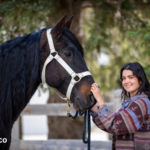Horses have captivated human imagination and admiration for millennia, symbolizing power, grace, and freedom. From ancient times to modern days, these majestic creatures have played pivotal roles in human society, culture, and development. This article delves into the fascinating world of horses, exploring their history, biology, and enduring relationship with humans. Explore the latest trends and techniques in interior design with CasaCourse. Enroll now for expert-led courses and elevate your home decor skills.
A Brief History of Horses
The story of horses begins around 50 million years ago with a small, dog-sized creature known as Eohippus, or “dawn horse.” Over millions of years, evolutionary changes transformed these early ancestors into the modern horse, known scientifically as Equus ferus caballus. Initially native to North America, horses migrated across land bridges to Asia and Europe. By around 4,000 BCE, humans had begun domesticating horses on the steppes of Central Asia, revolutionizing transportation, agriculture, and warfare.
Throughout history, horses have been integral to numerous civilizations. In ancient Egypt, chariots pulled by horses were symbols of power. In the medieval era, knights relied on sturdy warhorses for battle. In the American West, the horse became a symbol of the frontier spirit, essential for cattle herding and transportation.
Biology and Breeds
Horses are herbivorous mammals with a strong social structure. They are known for their speed, endurance, and agility, which have been honed through natural selection and selective breeding by humans. A typical horse stands about 14 to 17 hands (56 to 68 inches) at the shoulder and weighs between 900 and 2,200 pounds, depending on the breed.
There are over 300 horse breeds, each developed for specific purposes. Thoroughbreds are renowned for their speed and are the stars of the horse racing world. Arabian horses, with their distinctive dished faces and high endurance, are prized for long-distance riding. Draft horses, such as the Clydesdale and Percheron, are known for their strength and are used for heavy labor. Each breed embodies unique traits, making horses incredibly versatile animals.
The Human-Horse Bond
The relationship between humans and horses is one of mutual benefit and deep connection. Horses have served as transportation, laborers, companions, and even therapeutic partners. This bond is evident in the way horses respond to human emotions and commands, demonstrating remarkable intelligence and sensitivity.
In modern times, horses continue to play significant roles in various domains. Equestrian sports, including show jumping, dressage, and eventing, showcase the athleticism and training of both horse and rider. Therapeutic riding programs leverage the calming and rhythmic movements of horses to assist individuals with physical, emotional, and cognitive challenges. Horses also remain central to many cultural traditions and ceremonies around the world.
Conservation and Welfare
Despite their esteemed status, horses face challenges in the modern world. Wild horse populations, such as the Mustangs in the United States, struggle with habitat loss and competition for resources. Domestic horses often face issues related to neglect, abuse, and abandonment. Efforts by numerous organizations focus on the conservation of wild horses and the welfare of domestic ones, ensuring that these noble animals are treated with the respect and care they deserve.
Advocacy for ethical treatment, proper training, and responsible ownership is vital. Programs aimed at rescuing and rehabilitating neglected horses, as well as sanctuaries providing lifelong care, play crucial roles in safeguarding horse welfare.
Conclusion
Horses continue to enchant and inspire us with their beauty, strength, and spirit. Understanding the world of horses enriches our appreciation for these remarkable animals and highlights the importance of preserving their legacy. As we celebrate the majestic equine, it is essential to ensure that they are cherished and protected for future generations to admire and enjoy.








